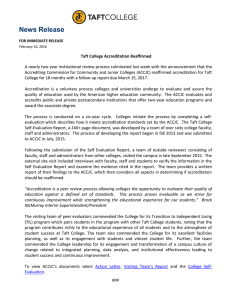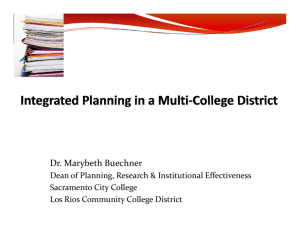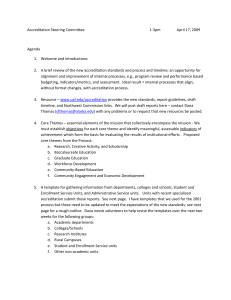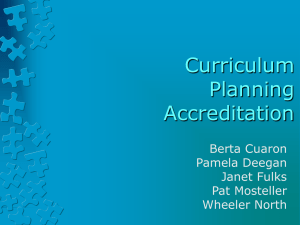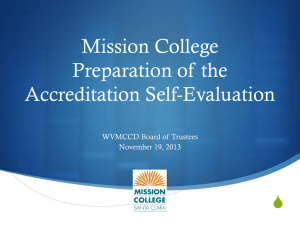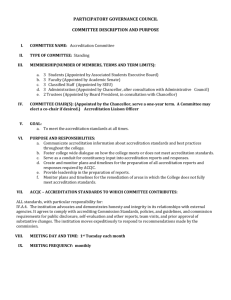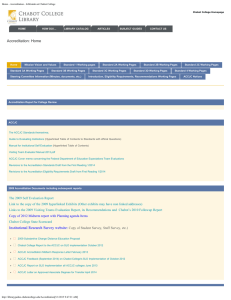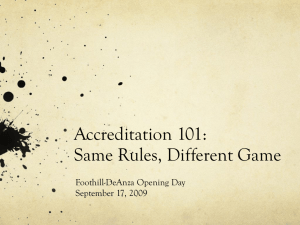Commission Requirements Regarding Program Review and
advertisement
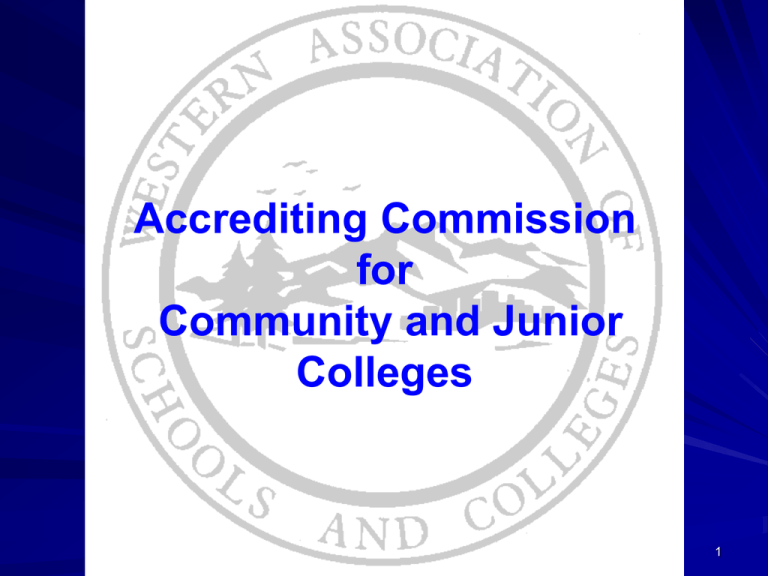
Accrediting Commission for Community and Junior Colleges 1 Elements of an Effective Program Review for Integrated Planning, Learning Outcomes, and Assessment Dr. Barbara Beno, President Mr. Jack Pond, Vice President Accrediting Commission for Community and Junior Colleges/WASC Capacity Building for Educational Excellence through Program Review and Integrated Institutional Planning West Valley College, April 29, 2011 2 Presentation Outline Accreditation Basics Commission requirements regarding program review and integrated planning An overview of the component parts of a viable program review process Concluding remarks 3 Accreditation Basics 4 The Purposes of Accreditation are: To provide assurance to the public that education provided by institutions meets acceptable levels of quality To promote continuous institutional improvement To maintain the high quality of higher education institutions in the region/nation 5 Continued Accreditation is the proven method for assuring that higher education institutions can continue to improve and offer a quality education to the men and women who will lead their communities in the future. By establishing high standards and then periodically evaluating themselves, colleges and universities can provide a degree or certificate that students and the community trust. 6 What Authority does ACCJC have to Impose Standards on Institutions? The ACCJC and other regional accrediting bodies are authorized to operate by the U.S. Department of Education through the Higher Education Opportunity Act for periods of five years Accreditation from a U.S. Department of Educationrecognized accreditor, such as the ACCJC, enables institutions to qualify for federal Title IV funds and other federal grants and contracts Accreditation is voluntary self regulation. Institutions voluntarily agree to meet Accreditation Standards. They give the Commission the requisite authority 7 Commission Requirements Regarding Program Review and Integrated Planning 8 Commission Requirements on Program Review and Planning The Commission expects institutions to be at the Sustainable Quality Improvement level in Program Review of instructional and non-instructional programs and services The Commission expects institutions to be at the Sustainable Quality Improvement level in Planning Source: Commission Rubric of June 25, 2009 9 Commission Requirements on Student Learning Outcomes The Commission expects institutions to now be at the Development level or above in Student Learning Outcomes, since these are the newest requirements included in the Accreditation Standards The Commission further expects institutions to be at Proficiency level in the identification, assessment, and use of improvements of student learning outcomes by Fall 2012 Source: Commission Rubric of June 25, 2009 10 Elements of Effective Program Review 11 Institutional Mission District Mission and Expectations Programmatic Mission Outcomes Identify Gaps Design Program Changes Inputs Allocate Needed Resources Analysis of Outcomes Assessment Implement Program Process Align Resources 12 Outcomes Student Achievement Student Learning 13 Development of Student Learning Outcomes Course Level: Discipline Faculty Program Level: programmatic faculty in the disciplines and external clients (employers, transfer institutions, & the public) Institutional Level: Faculty, Academic Administrators Trustees Through the Mission, Values, and Commitment 14 Institutional Mission Programmatic Mission Outcomes Identify Gaps Design Program Changes Inputs Allocate Needed Resources Analysis of Outcomes Assessment Implement Program Process Align Resources 15 Program Implementation Scheduling and sequence of courses Alignment with general education courses 16 Assessment Gather meaningful student achievement data Measure attainment of student learning outcomes Data are qualitative and quantitative Data are longitudinal where appropriate Outcomes data are continually collected and analyzed 17 Analysis of Outcomes Understanding the meaning of the data collected • Judgments about what is good enough must be made • Institutional and system governance groups must be informed Some colleges collect data through the district/system; others collect data independently 18 Gap Analysis Comparison of actual outcomes with intended or targeted outcomes. What worked to attain intended outcomes? What part(s) of the program needs to be changed to attain intended outcomes? 19 Design Program Changes To program and course outcomes To inputs and processes To human, physical, technological and financial resources Programmatic changes must be in line with mission Planned changes must inform the process of budget allocation System consultation is pivotal 20 (Re)Allocate Needed Resources • Results of program review are clearly and consistently linked to the institutional planning and resource (re)allocation processes • Constituent groups on campus are involved in the decision-making processes • Board Governance decisions reflect institutional priorities identified through assessment District/system support necessary to ensure that program review leads to meaningful improvements at the college 21 Reallocate Needed Resources •Program review and planning inform/direct resource reallocation District/system support necessary to ensure that program review leads to meaningful improvements at the college 22 Concluding Remarks 23 The Sustainable Continuous Quality Improvement Level of Program Review Program review processes are ongoing, systematic, and used to assess and improve student learning and achievement; the Board is informed of successes and needed improvements The institution reviews and refines the program review process to improve institutional effectiveness The results of program review are used to continually refine and improve program practices resulting in improvements in student achievement and learning 24 Culture and Practices of Assessment Institutional Commitment – – – – Program review Institutional effectiveness Information sharing Systemic assessment planning – Common assessment terminology – Professional development – Planning and resource allocation – Involvement and support from President Faculty Staff Information technology – Board support for CQI 25 Thank You ACCJC/WASC 10 Commercial Blvd, Suite 204 Novato, CA 94949 Tel: 415-506-0234 Fax: 415-506-0238 Website: www.accjc.org Email: accjc@accjc.org 26

